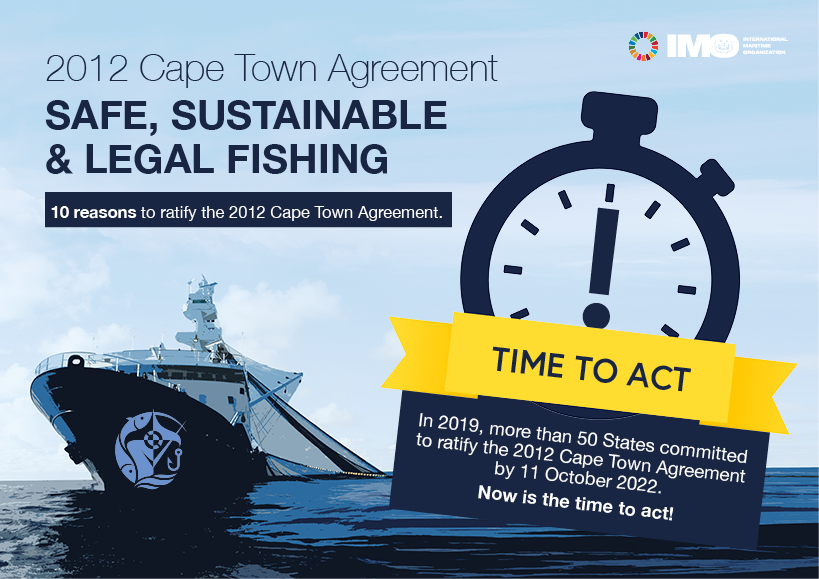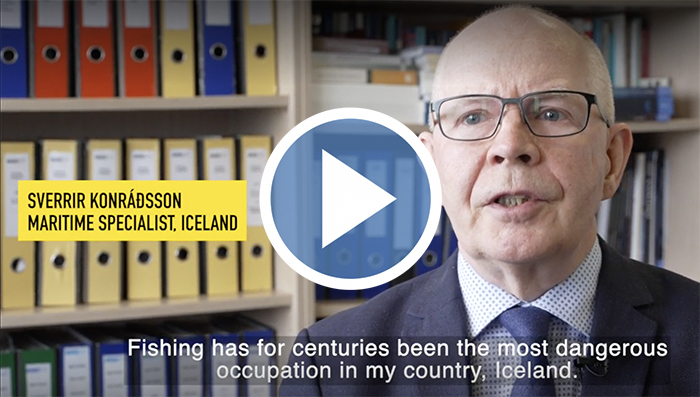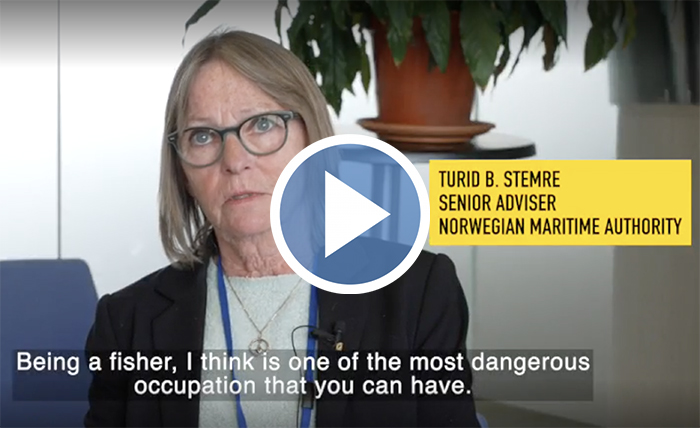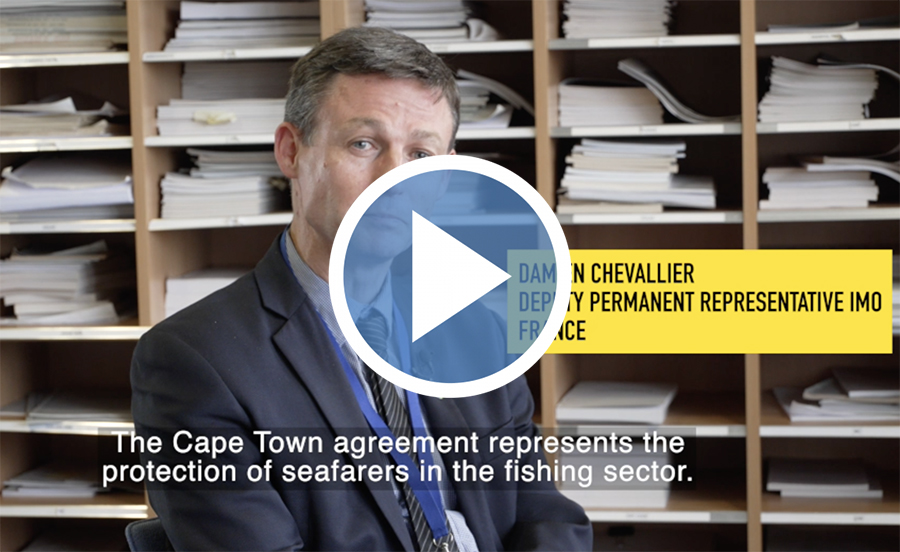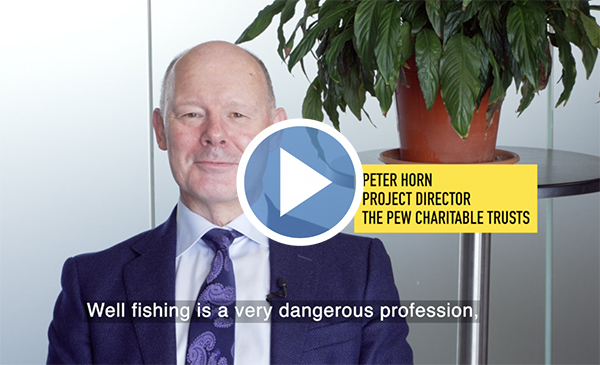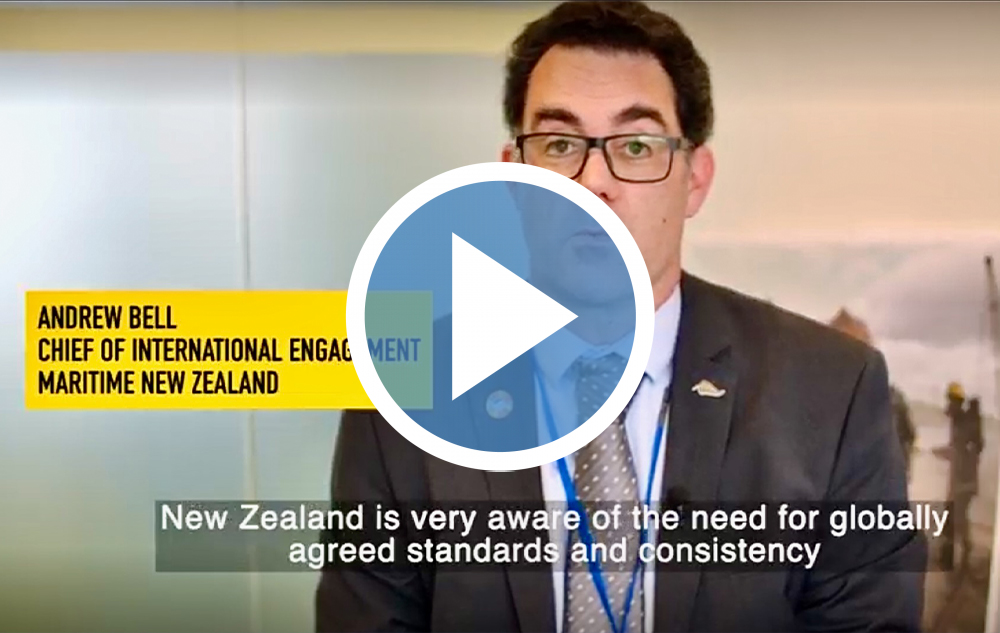2012 Cape Town Agreement to enhance fishing safety

Fishing is one of the most dangerous professions in the world, with thousands of fishers estimated to lose their lives every year when working to supply the
world's growing appetite for fish and fish products. There are about 4.6 million fishing vessels in operation around the world.
IMO has been working to increase safety in this sector for many years in partnership with stakeholders such as the International Labour Organization, Pew Charitable Trusts, etc
The IMO treaty on training for fishers is in force (STCW-F), but the Cape Town Agreement of 2012 (CTA), the global treaty for safety of fishing vessels, is not yet in force.
IMO is raising awareness of the 2012 Cape Town Agreement (CTA) to help bring it into force. In 2019, more than 50 States committed to ratify the 2012 Cape Town Agreement by 11 October 2022.
The importance of the Cape Town Agreement
The CTA, when in force, will contribute to safe, legal and sustainable shipping. The agreement is expected to boost safety standards for more than 64,000 vessels world wide that are 24 metres in length. It is aimed at facilitating better control of fishing vessel safety by flag, port and coastal States. The CTA is also expected to contribute to the fight against Illegal, Unreported and Unregulated (IUU) fishing and prevent marine plastic pollution from abandoned fishing nets and other equipment.
Click on the image below to download a PDF of "10 reasons to ratify the 2012 Cape Town Agreement".
FAQs: The 2012 Cape Town Agreement
The 2012 Cape Town Agreement is an internationally-binding instrument that sets minimum requirements on the design, construction, equipment, and inspection of fishing vessels of 24 meters in length and over or equivalent in gross tons. The Agreement includes mandatory international requirements for stability and associated seaworthiness, machinery and electrical installations, life-saving appliances, communications equipment and fire protection, as well as fishing vessel construction. For more a more detailed explanation about the 2012 Cape Town Agreement, click here.
The treaty will enter into force 12 months after at least 22 States, with an aggregate 3,600 fishing vessels of 24 m in length and over operating on the high seas have expressed their consent to be bound by it.
At present there are 22 contracting Member States to the CTA : Belgium, Belize, Congo, Cook Islands, Croatia, Denmark, Finland, France, Germany, Iceland, Japan, Kenya, The Netherlands, New Zealand, Nicaragua, Norway, Peru, Portugal, Saint Kitts and Nevis, Sao Tome and Principe, South Africa and Spain.
As with other international treaty instruments, the Cape Town Agreement needs to be ratified and implemented. Different countries have different processes for doing this. They may need to look at existing regulations for fishing vessels, if any, and see whether they need to be adapted or updated.
IMO can assist with technical and legal training and support, through its technical cooperation programme. The Implementation Guidelines on Part B of the Code, the Voluntary Guidelines and the Safety Recommendations could be useful for States implementing the provisions of the 2012 Cape Town Agreement, although the main purpose of these Guidelines is to assist competent authorities in the implementation of voluntary instruments.
International treaties such as the International Convention for the Safety of Life at Sea (SOLAS) have been in force for any decades for commercial shipping, including cargo and passenger ships. SOLAS includes a number of regulations which are applicable to all ships, such as its SOLAS chapter V, on safety of navigation. However, many other SOLAS regulations provide an exemption for fishing vessels.
Unlike other merchant ships, which load cargo in a port and then carry it to unload at another port, fishing vessels set out to sea unladen, catch fish and sail back to port with their catch of fish. Some larger trawlers and factory ships freeze, process and tin fish, out at sea.
IMO has been working to address fishing vessel safety for many decades. In collaboration with the Food and Agriculture Organization of the United Nations (FAO) and the International Labour Organization (ILO), IMO has developed and revised a series of non-mandatory instruments which address the design, construction and equipment of fishing vessels, including:
Code of Safety for Fishermen and Fishing Vessels, 2005;
Revised Voluntary Guidelines for the design, construction and equipment of small fishing vessels, 2005;
Safety recommendations for decked fishing vessels of less than 12 metres in length and undecked fishing vessels; and
Implementation Guidelines on Part B of the Code, the Voluntary Guidelines and the Safety Recommendations (Implementation Guidelines).
In 1977, IMO adopted the Torremolinos International Convention for the Safety of Fishing Vessels, which was later modified by the 1993 Torremolinos Protocol. As both of these treaties had failed to come into force, IMO later adopted the 2012 Cape Town Agreement, to bring into effect the provisions of the earlier treaties.
The Cape Town Agreement includes mandatory international requirements for stability, construction and associated seaworthiness of fishing vessels of 24 metres in length and over, as well as requirements for life-saving appliances, communications equipment and fire protection.
It should be noted that IMO's MARPOL regulations for the prevention of pollution from ships do apply to fishing vessels, including regulations for the prevention of pollution by garbage from ships, which prohibit the discharge of garbage and operational waste, including Annex V discharge requirements 07-2013.pdf, into the sea.
Illegal, unreported and unregulated (IUU) fishing refers to fishing which is carried out without proper authorization. This can undermine national, regional and global efforts to conserve and manage fish stocks. IUU fishing affects about 20 per cent of the global fish yields and IUU fishing costs the industry about $US23 billion a year in lost incomes.
Fishing vessels used in IUU fishing may have been authorized to fly a specific flag, but may be evading proper flag State control. Supervision and control of these vessels may be lacking. There may also be incidents of fishing vessels with fraudulent certificates. Port and coastal State control may not be sufficient to monitor and control these vessels.
Vessels being used for IUU fishing are likely to lack basic safety equipment and pose a risk to fishers – who may be poorly paid or even enslaved.
FAO says that Illegal, Unreported and Unregulated (IUU) fishing is a broad term, which includes:
The Pew Charitable Trusts says that IUU fishing can include failing to report catch, using illegal gear, fishing without licenses, and even painting new names on vessels while at sea to avoid detection by authorities. This activity cheats coastal communities out of food and income, skews scientific stock assessments, undermines law-abiding fishers, and deceives consumers who trust that the fish they purchase was caught within the law. Illegal fishing is a major threat to the sustainability of the world's fisheries.
For cargo and passenger ships, the four pillars for safety, environmental protection and seafarers' training and rights are said to be IMO's SOLAS, MARPOL and STCW treaties; alongside ILO's Maritime Labour Convention (MLC 2006). All these instruments are in force.
For fishing and fishers, the four pillars are:
- IMO's 2012 Cape Town Agreement (not yet in force)
- IMO's STCW-F Convention on training of fishers – it entered into force in 2012.
- ILO's Work in Fishing Convention 2007 (Convention No. 188) entered into force on 16 November 2017. It sets minimum requirements for work on board including hours of rest, food, minimum age and repatriation.
- FAO's Agreement on Port State Measures to Prevent, Deter and Eliminate Illegal, Unreported and Unregulated Fishing (PSMA), 2009, which entered into force in 2016. It seeks to prevent, deter and eliminate IUU fishing through the adoption and implementation of effective port State measures.
Yes. Identifying and tracking fishing vessels and being able to establish their ownership is an important part of ongoing work to tackle IUU fishing.
In 2017, the IMO Assembly agreed to extend the IMO Ship Identification Number Scheme to more vessels, on a voluntary basis, to support ship safety and pollution prevention by being able to more easily identify vessels.
The number scheme applies to ships over 100 gross tonnage and is mandatory for passenger ships of 100 gross tonnage and upwards and all cargo ships of 300 gross tonnage and upwards. In 2013, the IMO Assembly agreed to the voluntary extension of the scheme to fishing vessels over 100 gross tonnage. In 2017, the IMO Assembly agreed to further extend voluntary application to fishing vessels of steel and non-steel hull construction; passenger ships of less than 100 gross tonnage, high-speed passenger craft and mobile drilling units, engaged on international voyages; and to all motorized inboard fishing vessels of less than 100 gross tonnage down to a size limit of 12 metres in length overall authorized to operate outside waters under national jurisdiction of the flag State.
The IMO Secretariat continues to participate in the working group of the FAO's Global Record of Fishing Vessels, Refrigerated Transport Vessels and Supply Vessel. This is a phased and collaborative global initiative to make available, in a rapid way, certified data from State authorities about vessels and vessel-related activities.
IMO works with IHS Maritime & Trade for the allocation of the IMO Ship Identification Number. The current vessel database contains about 24,000 fishing vessels, fishing research vessels, fishing survey vessels, fish carriers, fishery support ships, fish factory ships and fish farm ships.
Yes, the fourth Joint IMO/FAO Working Group on IUU fishing and related matters met in 2019.
The group recommended the three organizations promote and support the development of ways to increase coordination and information sharing for inspection procedures at national level. Guidance could be developed, to facilitate coordination and information sharing between authorities carrying out inspections in port, in both merchant and fishing sectors, in line with relevant international instruments related to fishing vessels, fishing vessel personnel and fishing operations.
Read the outcome here.
IMO works closely with its sister UN organizations, the International Labour Organization (ILO) and the Food and Agriculture Organization (FAO), in particular with a view to supporting the entry into force of the 2012 Cape Town Agreement as well as the implementation of MARPOL Annex V on regulations to prevent pollution by garbage from ships.
The work being done to promote the ratification and implementation of the 2012 Cape Town Agreement on the safety of fishing vessels and other activities to improve safety and sustainability in the fishing sector and fight IUU fishing is also being supported by international governmental and non-governmental organizations.
These include: the North East Atlantic Fisheries Commission (NEAFC), the Organisation for Economic Co-operation and Development (OECD), the Institute of Marine Engineering, Science and Technology (IMarEST), the International Transport Workers Federation (ITF), the Pew Charitable Trusts, the World Animal Protection and the World Wide Fund for Nature (WWF).
Abandoned, lost or otherwise discarded fishing gear can become a navigational hazard, as well as being a source of marine litter. The discharge of fishing gear into the sea is prohibited under MARPOL Annex V, regulations for the prevention of pollution by garbage from ships.
Effective marking of fishing gear is seen as a critical tool in addressing the problem. This would also help better implementation of the Annex V regulations.
The GloLitter Partnerships (GLP) is a project between the Government of Norway, IMO and FAO aiming to reduce marine litter. FAO and IMO previously collaborated on the Global Partnership for Marine Litter (GMPL).
FAO has agreed FAO Voluntary Guidelines on the Marking of Fishing Gear. FAO and the GLP have also issued a report on Legal aspects of abandoned, lost or otherwise discarded fishing gear that can be downloaded here.
IMO's Marine Environment Protection Committee is currently looking into how to further address the issue of marine plastic litter from shipping in the context of 2030 Sustainable Development Goal 14 (SDG 14).
Ensuring safe and sustainable fishing is clearly linked with the achievement of the targets of UN SDG 14 on the oceans.
There are also clear links with other UN SDGs, including those relating to poverty, hunger, education and training, infrastructure and partnerships.
Download the factsheet on the Cape Town Agreement and the SDGs
Seafood is a highly-sought after and nutritious meal for millions of people across the world - and an essential food protein in many developing countries.
IMO's Maritime Safety Committee has considered how the safety measures of the International Code for Ships Operating in Polar Waters (Polar Code) might be applied in the future to non-SOLAS vessels operating in polar waters. The Polar Code provides additional requirements for ships operating in the harsh environment of the Arctic waters and Antarctic area.
As a first step, the MSC has instructed the Sub-Committee on Ship Design and Construction (SDC 6) to develop recommendatory safety measures for certain types of vessels when operating in polar waters, including fishing vessels of 24 m in length and over, with a view to alignment with the 2012 Cape Town Agreement.
Generally speaking, these small vessels come under national legislation. IMO has developed, in collaboration with FAO and ILO, a number of non-mandatory instruments, for use primarily by competent authorities, training institutions, fishing vessel owners, fishermen's representative organizations and non-governmental organizations having a recognized role in fishermen's safety and health and training. These non-mandatory instruments may complement the 2012 Cape Town Agreement on matters related to crew accommodation and personnel.
Ministerial Conference on Fishing Vessel Safety and IUU Fishing, Spain, October 2019
The Ministerial Conference on Fishing Vessel Safety and Illegal, Unreported and Unregulated (IUU) Fishing, organized by IMO and the Government of Spain, Torremolinos, Málaga, Spain (21-23 October 2019), promoted ratification of the Cape Town Agreement, a key IMO treaty for safety of fishing vessels. The entry into force of the Cape Town Agreement will help deter the proliferation of illegal, unregulated and unreported (IUU) fishing, by establishing international safety standards for fishing vessels.
During the conference, nearly 50 States signed the Torremolinos Declaration, publicly indicatin g their determination to ratify the Agreement by the target date of 11 October 2022 (tenth anniversary of the adoption of the Agreement).
Read more here.
The Conference was co-hosted by IMO and the Government of Spain, with the kind support of the Food and Agriculture Organization of the United Nations (FAO) and The Pew Charitable Trusts. Read more here.
Webinars
IMO has been working with Member States and relevant stakeholders for capacity building to implement the 2021 Cape Town Agreement. In 2020-2022 it held
a series of regional webinars aimed at decision-makers from maritime Administrations, fisheries authorities and maritime law enforcement agencies.
